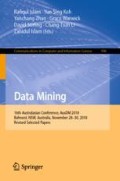Abstract
An effective missing data imputation method is essential for data mining and knowledge discovery from a comprehensive database with missing values. This paper proposes a new hybrid imputation method to effectively deal with the missing data issue of the Mobility in Cities Database (MCD) to construct city mobility indices. The hybrid method integrates the advantages of decision trees and fuzzy clustering into an iterative algorithm for missing data imputation. Extensive experiments conducted on the MCD and three commonly used datasets demonstrate that the hybrid method outperforms other existing effective imputation methods. With the MCD’s missing values imputed by the hybrid method, and using factor analysis and principal component analysis, this paper constructs city mobility indices for 63 cities in the MCD based on the novel concept of city mobility supply and demand. The city mobility indices constructed under a hierarchical structure of mobility supply and demand indicators represent substantial city mobility knowledge discovered from mining the MCD. The proposed hybrid method represents a significant contribution to missing data imputation research.
Access this chapter
Tax calculation will be finalised at checkout
Purchases are for personal use only
References
Nikfalazar, S., Amiri, M., Khorshidi, H.A.: Social impact assessment on metro development with a case study in Eastern District of Tehran. Int. J. Soc. Syst. Sci. 6(3), 245–263 (2014)
Rassafi, A.A., Vaziri, M.: Sustainable transport indicators: definition and integration. Int. J. Environ. Sci. Technol. 2(1), 83–96 (2005)
Violato, R.R., Galves, M.L., de Oliveira, D.D.G.: Non-motorized mobility in central urban areas: application of multi-criteria decision aid in the city of campinas, Brazil. Int. J. Sustain. Transp. 8(6), 423–446 (2014)
Haghshenas, H., Vaziri, M.: Urban sustainable transportation indicators for global comparison. Ecol. Ind. 15(1), 115–121 (2012)
Moeinaddini, M., Asadi-Shekari, Z., Zaly Shah, M.: An urban mobility index for evaluating and reducing private motorized trips. Measurement 63, 30–40 (2015)
Albalate, D., Bel, G.: What shapes local public transportation in Europe? Economics, mobility, institutions, and geography. Transp. Res. Part E Logist. Transp. Rev. 46(5), 775–790 (2010)
Albalate, D., Bel, G.: Tourism and urban public transport: holding demand pressure under supply constraints. Tour. Manag. 31(3), 425–433 (2010)
Alonso, A., Monzón, A., Cascajo, R.: Comparative analysis of passenger transport sustainability in European cities. Ecol. Ind. 48, 578–592 (2015)
Reisi, M., Aye, L., Rajabifard, A., Ngo, T.: Land-use planning: implications for transport sustainability. Land Use Policy 50, 252–261 (2016)
Joumard, R., Gudmundsson, H., Folkeson, L.: Framework for assessing indicators of environmental impacts in the transport sector. Transp. Res. Rec. 2242, 55–63 (2011)
UITP: Mobility in cities database. International Association of Public Transport, Brussels (2015)
Nikfalazar, S., Yeh, C.-H., Bedingfield, S., Khorshidi, H.A.: A new iterative fuzzy clustering algorithm for multiple imputation of missing data. In: IEEE International Conference on Fuzzy Systems (FUZZ-IEEE), pp. 1–6. IEEE, Naples (2017)
Rahman, M.G., Islam, M.Z.: Missing value imputation using a fuzzy clustering-based EM approach. Knowl. Inf. Syst. 46(2), 389–422 (2016)
James, G., Witten, D., Hastie, T., Tibshirani, R.: An Introduction to Statistical Learning: with Applications in R. Springer, New York (2013). https://doi.org/10.1007/978-1-4614-7138-7
Sato-Ilic, M., Jain, L.C.: Innovations in Fuzzy Clustering: Theory and Applications. Springer, Heidelberg (2006). https://doi.org/10.1007/3-540-34357-1
Campello, R.J.G.B., Hruschka, E.R.: A fuzzy extension of the silhouette width criterion for cluster analysis. Fuzzy Sets Syst. 157(21), 2858–2875 (2006)
Junninen, H., Niska, H., Tuppurainen, K., Ruuskanen, J., Kolehmainen, M.: Methods for imputation of missing values in air quality data sets. Atmos. Environ. 38(18), 2895–2907 (2004)
Cevallos Valdiviezo, H., Van Aelst, S.: Tree-based prediction on incomplete data using imputation or surrogate decisions. Inf. Sci. 311, 163–181 (2015)
Rahman, M.G., Islam, M.Z.: Missing value imputation using decision trees and decision forests by splitting and merging records: two novel techniques. Knowl. Based Syst. 53, 51–65 (2013)
Cheng, K.O., Law, N.F., Siu, W.C.: Iterative bicluster-based least square framework for estimation of missing values in microarray gene expression data. Pattern Recogn. 45(4), 1281–1289 (2012)
Wang, X., Li, A., Jiang, Z., Feng, H.: Missing value estimation for DNA microarray gene expression data by support vector regression imputation and orthogonal coding scheme. BMC Bioinform. 7(32), 1–10 (2006)
Schneider, T.: Analysis of incomplete climate data: estimation of mean values and covariance matrices and imputation of missing values. J. Clim. 14, 853–871 (2001)
Hair, J.F., Black, W.C., Babin, B.J., Anderson, R.E.: Multivariate Data Analysis, 7th edn. Pearson Prentice Hall, Upper Saddle River (2014)
Tate, E.: Social vulnerability indices: a comparative assessment using uncertainty and sensitivity analysis. Nat. Hazards 63(2), 325–347 (2012)
Reckien, D.: What is in an index? Construction method, data metric, and weighting scheme determine the outcome of composite social vulnerability indices in New York City. Reg. Environ. Change 18(5), 1439–1451 (2018)
Eyler, L., Hubbard, A., Juillard, C.: Assessment of economic status in trauma registries: a new algorithm for generating population-specific clustering-based models of economic status for time-constrained low-resource settings. Int. J. Med. Inf. 94, 49–58 (2016)
Tajik, P., Majdzadeh, R.: Constructing pragmatic socioeconomic status assessment tools to address health equality challenges. Int. J. Prev. Med. 5(1), 46–51 (2014)
Vidal, R., Ma, Y., Sastry, S.S.: Generalized Principal Component Analysis. Interdisciplinary Applied Mathematics. Springer, New York (2016). https://doi.org/10.1007/978-0-387-87811-9
Author information
Authors and Affiliations
Corresponding author
Editor information
Editors and Affiliations
Rights and permissions
Copyright information
© 2019 Springer Nature Singapore Pte Ltd.
About this paper
Cite this paper
Nikfalazar, S., Yeh, CH., Bedingfield, S., Khorshidi, H.A. (2019). A Hybrid Missing Data Imputation Method for Constructing City Mobility Indices. In: Islam, R., et al. Data Mining. AusDM 2018. Communications in Computer and Information Science, vol 996. Springer, Singapore. https://doi.org/10.1007/978-981-13-6661-1_11
Download citation
DOI: https://doi.org/10.1007/978-981-13-6661-1_11
Published:
Publisher Name: Springer, Singapore
Print ISBN: 978-981-13-6660-4
Online ISBN: 978-981-13-6661-1
eBook Packages: Computer ScienceComputer Science (R0)

